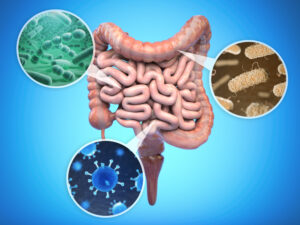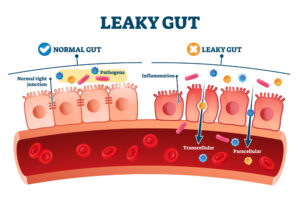How A Fecal Transplant Can Improve Your Gut
Article At A Glance:

- Healing the gut & reducing inflammation can lead to markedly improved social and emotional behaviors for children with autism.
- A study from Arizona State University showed that fecal transplants improve autism behaviors.
- Research from the Baylor School of Medicine showed that introducing a single strain of behavior to the gut led to increased sociability and oxytocin production.
https://www.youtube.com/watch?v=uoe83ecvNK8
Over and over, we go back to the simple yet powerful fact that healing the gut and reducing inflammation can significantly improve children with autism. Although hundreds of studies confirm this, I wanted to look at two in particular.
Fecal Transplants
Researchers at Arizona State University had noticed that individuals with autism often had compromised gut health. Hoping to find answers, they performed fecal transplants over a ten-week period, leading to an 80% improvement in GI health and 25% improvement in social skills and sleep habits.
I know that fecal transplants may sound very strange and off-putting, and I’m not necessarily suggesting that anyone try this technique. Still, it does prove the point of what we’ve been discussing: healing the gut microbiome leads to improved outcomes.
Oral Probiotics
Another study from Baylor College of Medicine demonstrated the power of oral probiotics. Researchers fed mice with autism-like behaviors a single strain of bacteria called Lactobacillus reuteri. Over time, this led to improved sociability and an increased number of oxytocin-produced neurons (the chemicals that help us feel a connection with others). If ONE strain of bacteria could cause such a huge difference, imagine what a quality probiotic (with several strains) could do for our children.
Friends, this is not just a theory or a nice idea. Scientific study has proven what we’ve been saying all along: if you want to help your child reach their full potential, you need to look at the root cause and heal the gut through nutritious, toxin-free foods and high-quality foods supplementation.
*This website is provided for informational purposes only and is not intended as a substitute for the advice provided by a healthcare professional.
Five Supplements To Heal the Gut
Article At A Glance:

- Supplements are a powerful addition to quality, toxin-free foods to help individuals and children with autism reach their full potential.
- Probiotics, digestive enzymes, omega 3 fatty acids, L-Glutamine, and collagen protein are 5 supplements that can reduce inflammation and improve gut function.
- The goal is to introduce supplements one at a time to achieve simple, sustainable changes.
In addition to toxin-free, nourishing foods, supplements are critical to fill in the nutritional gaps and help our children get out of survival mode to a place where they can thrive. Here are five specific supplements to support strong gut health:
1. Probiotics
Probiotics are live microorganisms that improve gut health by helping to balance out the good bacteria and reducing inflammation. Aspire Nutrition’s signature product BioHeal is a probiotic that is sugar-free, dairy-free, toxin-free, filler-free, and gluten-free. It also contains 3 million CFUs (colony forming units) from 12 strains to offer comprehensive gut support.
2. Digestive Enzymes
Our bodies contain enzymes that help break down the food that we eat. By giving an added boost of digestive enzymes through supplements, the symptoms of autism can improve because there isn’t inflammation from undigested food crossing into the blood and the brain.
3. Omega 3 Fatty Acids
Omega 3 Fatty Acids are fish oils that reduce inflammation. They occur naturally in some fish and are also available as a fish oil supplement.
4. L-Glutamine
L-Glutamine is an anti-inflammatory amino acid that fixes the leaky gut. It covers the cell walls and strengthens the body’s ability to permit only good bacteria to pass through.
5. Collagen Protein
Collagen protein is available in either supplement form or bone broth. It effectively decreases gut permeability and gets those tight junctions back to improve the balance of good and bad bacteria.
As we have discussed before, beginning supplements can seem overwhelming and intimidating. The goal is not to do everything at once but to start small and implement sustainable life changes to improve gut health and overall functioning.
*This website is provided for informational purposes only and is not intended as a substitute for the advice provided by a healthcare professional.
What Is the Gut?
Article At A Glance:

- The “gut” includes all organs from the mouth to the large intestine and is the epicenter of disease and dysfunction
- Good and bad bacteria make up the gut microbiome
- Children with autism usually suffer from poor gut health
As we constantly talk about the need for good gut health to help children with autism reach their full potential, it’s easy to get a little lost in the language. So let’s back up and define our terms:
The “gut” is all the organs from the mouth to the large intestines. I often use the analogy that the body is the car while the gut is the engine. Scientifically, medically, and culturally, we’re beginning to understand how much the gut affects our overall health. The Greek physician Hippocrates once said that “all disease begins in the gut,” and centuries later, we learn he was right!
So what are some of the specific functions of the gut? It digests food and regulates our immune system. The gut also helps control our mood, as the feel-good chemical serotonin is produced in the intestinal tract. It eliminates toxins and waste from our bodies. It is not an exaggeration to say that the gut affects everything in our systems.
Microbiome of Bacteria
When most people hear the word “bacteria,” they think of germs and dirt we should eliminate with purell hand sanitizer. And while we should still wipe our counters and toilet bowls, the truth is that gut bacteria is very good. Hundreds of species play different roles; the whole ecosystem is our microbiome. How well the microbiome functions affect our set weight point, sociability, brain development, and mood.
The Gut & Autism
This topic is particularly important for families of children with autism because research shows that they often have poor gut health. Abnormal colonies of bacteria, less gut diversity, and even leaky gut can wreak havoc on their systems and contribute to poor social and emotional functioning.
Aspire Nutrition educates families and individuals on how the gut affects our bodies, brains, and behavior. It equips them to achieve good gut health through quality, toxin-free foods and proper supplementation.
Eating Healthy At Social Events
Article At A Glance:

- Social events (like parties and barbeques) can test our resolve to help our children eat in a way that helps heal them
- With some forethought and preparation, your kids CAN enjoy parties while still maintaining healthy eating habits
Birthday parties are a staple of the childhood experience. What kid doesn’t love hitting the piñata, jumping on the inflatable castle, and playing games with friends? But if your child has autism and you’ve committed to ensuring that they are eating foods that help them maintain the best optimal health, what can you do about the inevitable sugar-loaded foods lurking at such parties?
Navigating social events can be challenging, but you do not have to forego them altogether. Here are some tips to help stick to healthy eating even at parties:
Communicate With The Host
I tend to reach out before the event and see what foods will be available. If it’s a birthday party, cake and ice cream are almost inevitable, but you may be surprised to learn that other families also serve healthy options. The only way to know is to ask.
Serve A Large Meal Beforehand
If the social gathering has foods that could be a temptation, I often serve a filling meal to my son before the party in the hopes that he will be so full and satisfied that the junk foods will not be as appealing.
Provide “Safe Foods”
In cases where social events involve adults as well (such as family reunions or barbeques), I bring along safe alternatives to favorite foods that are tasty and healthy. For example, I’ll bring grass-fed organic hot dogs from Trader Joe’s to throw on the grill.
Committing to this lifestyle is certainly not easy, and when parties and other social gatherings come up, it’s tempting to throw up your hands and say, “just this one time won’t hurt.”
I challenge you, however, to stick with it. Take the time and energy to help your child eat better (even if not perfectly) by preparing healthier alternatives. Yes, some people may think you’re being too extreme, but you’re not doing it for them: you’re doing it to help your child reach their full potential. And that’s more than worth the extra effort.
*This website is provided for informational purposes only and is not intended as a substitute for the advice provided by a healthcare professional.
What Is A Leaky Gut?
Article At A Glance:
- The gut-brain axis means that the gut and the brain communicate with each other and that one profoundly affects the other.
- Healing the gut of children with autism lead to improved behavioral and social outcomes
- A leaky gut is ineffective at filtering out food particles, which leads to inflammation and compromised immunity.

We’ve often discussed the gut-brain axis, a significant scientific discovery that the gut (stomach and intestines) and the brain communicate with each other through the endocrine system. Hormones get released in the bloodstream, and the nervous system triggers signals in the brain that “talk” to the gut.
The gut-brain connection is one of the hottest topics in the health world right now because it means that changes in the gut directly impact what happens in the brain. This is especially relevant for children with autism because gut dysfunction (which is very common) can negatively affect the brain and lead to behavioral and social challenges. The goal is to heal the gut to improve kids’ overall health.
Leaky Gut
A healthy gut acts like a cheesecloth, allowing nutrients to pass through into the bloodstream while filtering out unprocessed food particles, toxins, and pathogens. It has tight junctions in the cells to keep the bad stuff out and let the good things in.
However, a leaky gut is ineffective in blocking food particles from entering the bloodstream. As a result, the body detects a threat and attacks the invaders the same way it would a virus or a bacterial infection. This leads to inflammation, compromised immunity, and even nutrient deficiency since your body is too busy fighting the perceived threat to digest vital nutrients correctly.
The gut biome affects the endocrine system, the immune system, the nervous system, and the metabolic system, and a leaky gut can cause major havoc for the body overall. However, high-quality, toxin-free foods and proper supplementation make good gut health possible.
Tuan’s Touching Story on How Bio-Heal Helped His Child Reach His Full Potential

Tuan is a father whose four-year-old son was having some behavioral challenges. When the daycare teachers suggested that his child may need a little more help, Tuan felt like a failure. Was he doing enough as a parent? How could he help his son overcome these problems?
After researching and learning about Aspire Nutrition’s Bio-Heal supplement, Tuan was a bit skeptical, so he decided to first try the supplement himself. Later when he introduced Bio-Heal to his son, he described the changes as rapid. His child’s vocabulary grew exponentially, which helped ease the frustration he felt about not being able to communicate appropriately. Their family can even go out to dinner now without worrying about tantrums or meltdowns!
Tuan understands that as parents, we want to give our children a better life than we had. The goal is to go organic, dairy-free, and gluten-free as much as possible, but since it’s hard to be 100% perfect with what we eat, the Bio-Heal supplement helps. Tuan encourages other families who may be struggling to consider trying Bio-Heal because our kids deserve the very best.
Three Common Questions About Supplements
Article At A Glance:

- In addition to quality, toxin-free foods, supplements can be a powerful way to help children with autism heal their gut dysfunction and improve their behavior.
- Thousands of clinical studies show evidence of the benefits of supplements for children on the autism spectrum.
- Introduce supplements one at a time, beginning with a digestive enzyme for mealtime.
We’ve discussed that what our children eat profoundly influences their behavior and how quality food can help heal their underlying gut dysfunction.
But diet alone won’t necessarily help them reach their full potential. Although theoretically, our children could get all the vitamins and nutrients needed from food, this is nearly impossible to achieve in practice. That’s why the 2R protocol guides us first to remove harmful toxins and then repair the body using supplements. Here are three common questions I get from parents wanting to begin using supplements for their children:
1) Can Supplements Help With the Symptoms of Autism?
Thousands of studies have shown the advantages of supplements for children with autism. And although every child is different, there are some common areas of biological dysfunction that supplements can help. Some of the main ones include gastrointestinal issues, inflammation, and helping the body detox. Supplements can also help with mood, sleep, and tantrums. Don’t overlook the overwhelming evidence of the benefits of supplements!
2) Are All Supplements Created Equal?
Unfortunately, some supplements are not as beneficial as others. And while the labels tell you what’s in it, the quality of ingredients in processing isn’t well regulated, so that the absorption rate can vary a lot. Some companies use a deceptive technique called “dusting,” where they put key ingredients in a supplement to market it even though the quantity isn’t enough to make a difference.
3) Should I Try Multiple Supplements at the Same Time?
As you first make your way into the world of supplements, start with just one at a time. Children on the autism spectrum are sensitive, so it’s important to gauge if new supplements cause adverse reactions. I suggest using a calendar and taking notes about mood or behavioral changes you observe for each new supplement your child takes.
Supplements can feel intimidating. If you’re a beginner, it’s a good idea to choose a digestive enzyme with meals that has the ingredient DPP4. DPP4 can help break down foods, increase absorption, and lower the amount of inflammation.
Using quality supplements (alongside organic, unprocessed foods) can go a long way in helping children with autism manage their symptoms, heal their gut, and reach their potential.
*This website is provided for informational purposes only and is not intended as a substitute for the advice provided by a healthcare professional.
Why “Healthy” Foods Can Be Harmful
Article At a Glance:

- Diet fundamentally changes our biology and affects energy levels, risk of disease, and brain function.
- Naturally, diet plays a large part in influencing the bodies of children with autism. It can either guide them to healing or further gut dysfunction and inflammation.
- Even foods that are otherwise “healthy” can be laced with pesticides and toxins that wreak havoc on our children’s already immunocompromised systems.
I’ve written before about how my son was diagnosed with autism shortly before his 3rd birthday. The doctor told me there wasn’t anything we could do to help him. As his father, I knew there had to be a better way than simply resigning myself to unending temper tantrums and disruptive behaviors.
After years of research, I understood that my son’s behavioral problems were a symptom of something deeper. The key to healing was to ease inflammation and address his gut dysfunction. I’m passionate about sharing my knowledge so that other families can have similar transformations as my son has experienced. Upon talking to many of these families, I’ve come across two significant myths about children with autism:
Myth 1: What I Feed My Child Doesn’t Affect Them
The mainstream medical community has not yet caught up to the science and real-world experience we now understand about managing autism. Hence, it’s understandable why some families might think this way at first. However, consider how much food influences us:
Diet affects our energy levels, susceptibility to infection, the likelihood of contracting cancer or heart disease, our athletic performance, etc. Food allergies can cause severe, deadly reactions if not managed or avoided. Alcohol significantly affects our liver and brain function. So why wouldn’t food affect the susceptible bodies of children with autism? It doesn’t make any sense.
If there is one thing I want you to take away from reading this post, it’s that food affects your child more than you can imagine.
Myth 2: “Healthy” Foods Can’t Be Harmful
Once we understand that foods can affect our children and can be either the catalyst to healing or further dysfunction, some mistakenly believe that “healthy” food can’t be harmful.
The truth is that you can be feeding your kids foods that are generally healthy in quality but laced with harmful toxins and pesticides that wreak havoc on their gut.
Some studies estimate that 75% of processed foods contain genetically modified ingredients and pesticides. The main ingredient in Round-Up (the most commonly used pesticide) kills the good bacteria that the gut needs to thrive. This leads to inflammation and can intensify the symptoms of autism.
Unfortunately, toxins are not just in foods. Still, they are lurking everywhere: infant formula, household cleaning products, laundry detergents, tap water, etc. Although it may seem daunting to completely overhaul your lifestyle and the products you buy to eliminate these toxins, I encourage you to start today by removing some of these pesticides. Opt for organic produce, grass-fed beef, cage-free eggs, etc. Choosing fresh foods without pesticides can pay huge dividends to your child’s health and behavior.
*This website is provided for informational purposes only and is not intended as a substitute for the advice provided by a healthcare professional.
References

Avoid These 2 Common Household Toxins
Article At a Glance:
• Toxins that can upset our children’s compromised immune systems are lurking everywhere.
• Two particular chemicals to avoid that are common in households are Phthalates and Parabens

As parents of children with autism or individuals wanting to improve our health, we need to be aware that toxins that can negatively affect them are all around us. Not only are they in our food, but they’re even in our normal environment through common products we likely encounter every day. These can range from cleaning agents to substances we apply to our skin. The products we buy have a direct effect on the toxicity of our homes, and here are two of the worst offenders:
Phthalates
Phthalates are toxins that have been linked to ADHD, breast cancer, obesity, behavioral issues, and a whole host of other problems. They are often lurking in cosmetics and air fresheners (such as wall plug-ins). Anytime you see the word “fragrance” on a product, you can almost be sure that it contains phthalates. And one of the worst things about them is that they are not required to be on labels. Instead of buying products that contain phthalates, we need to look for things that are organic and fragrance-free.
Parabens
Parabens are another chemical to avoid, as the Environmental Protection Agency has linked them to metabolic, hormonal, developmental, and reproductive issues. Parabens are used to increase shelf-life and are found in things like certain sunscreens and shampoo. Thankfully, products with this toxin are required to list parabens on the label, so they’re easier to avoid.
Friends, I’m not suggesting that we be paranoid or keep our kids in a bubble away from anything that could possibly ever cause a problem. We are real people living in the real world and can’t live in constant fear. Still, there are certain triggers that we need to be aware of, work to eliminate, and find better alternatives.
*This website is provided for informational purposes only and is not intended as a substitute for the advice provided by a healthcare professional.
References
The Toxin in Foods That Big Companies Don’t Want You To Know About
Environmental Toxins and Your Health
The Alarming New Evidence About Chemicals And Plastics We Use At Home

Best Practices for Buying Seafood and Poultry Meats
Article At A Glance:
- Shopping smart for seafood means buying wild-caught (as factory-farmed fish are high in toxins and low in nutrients)
- Conventionally-farmed chicken almost always contains arsenic, so, opt for organic.

Seafood
When it comes to eating seafood, I recommend wild-caught fish. The differences between wild-caught salmon compared to factory-farmed salmon are staggering. Factory-farm fish are lower in every nutrient and receive antibiotics and artificial colors to make them look more pink and attractive to buyers.
Shockingly, factory-farmed salmon has sixteen times the amount of polychlorinated biphenyls (PCB) toxins than wild salmon. PCB is a known carcinogen once used to manufacture electrical appliances. Although it has been banned for food processing worldwide, it still exists residually and contaminates salmon feed. Please avoid this harmful toxin and buy wild-caught salmon!
Poultry
You’ve heard me say it before, and I’ll repeat it. When it comes to meat, buy organic. By the FDA’s standards, this means that our kids won’t be consuming pesticides, hormones, and antibiotics. Also, here’s a shocking fact: chicken conventionally farmed often contains arsenic. Arsenic! Researchers from Johns Hopkins University randomly sampled non-organic chicken from several states and found that 100% of them included this poison (a known carcinogen). Yuck! If that’s not reason enough to buy organic, I don’t know what is.
I also highly suggest purchasing foods that say “pastured” on the label when it comes to poultry. This means that the chickens spend some of their day outside, meaning they’ll eat more of a natural diet, increasing their nutrient levels. If you’re feeling ambitious and want to go all-out in your healthy eating habits, look for poultry labels that say “air-chilled” as well. Instead of being dunked in a communal pool of chlorinated water to cool it down after cooking, the chicken cools in the air, which means that there is as much as 20% less chance of bacteria contamination.
If buying pastured or air-chilled chicken is a little too extreme for you, no worries. Just make sure it’s organic.
Friends, I know I say it repeatedly, but I really can’t emphasize how important it is to buy high-quality, organic food. I know it’s more work to cook at home, and I know it can be more expensive, but the results make it worth it.
*This website is provided for informational purposes only and is not intended as a substitute for the advice provided by a healthcare professional.
References
Farmed Salmon and Human Health: The Lowdown on PCBs
Study Show Elevated Levels of Arsenic in U.S. Chicken Mean
Air-chilling Poultry Carcasses: The New Trend
Use These Principles To Eat Healthy At Restaurants
